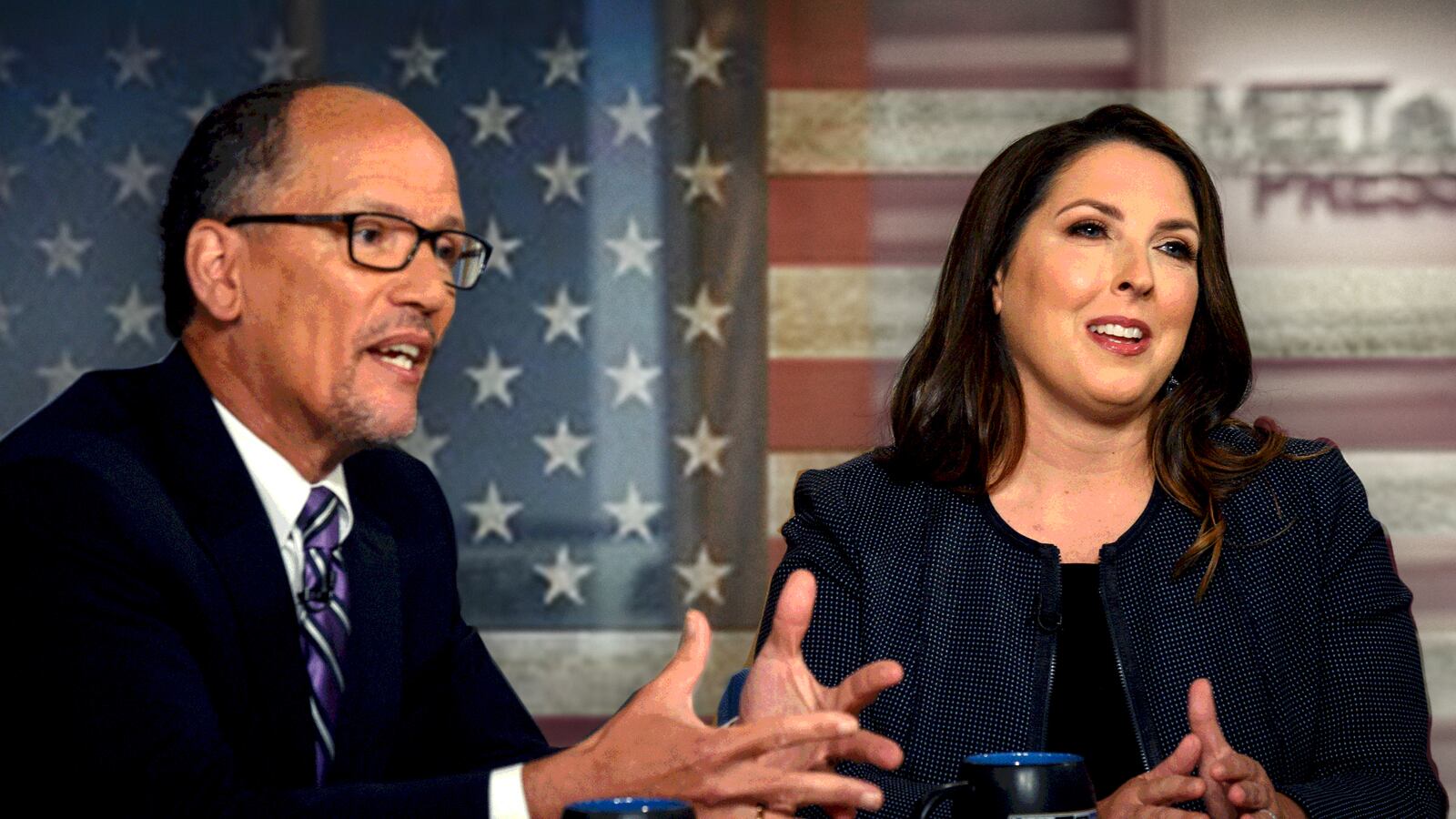On a recent Meet the Press segment, host Chuck Todd asked DNC Chairman Tom Perez and RNC Chairwoman Ronna Romney McDaniel if there was still room for moderates/centrists in their respective parties. Both, slightly taken aback, instantly proclaimed of course there is and that moderates were already flocking to their ranks.
Yet Todd, Perez and McDaniel all failed to understand the reality. It is not an issue of whether there is room for moderates in the parties. Instead, the real question is if either party tolerates or has room for people who do not 100 percent adhere to what their leadership says or does?
The answer is no, the bases of each party are becoming increasingly rigid when dealing with any member who does not stand with the party at every turn.
Simply put, many Republicans and Democrats view facts through partisan lenses and see that their own party is incapable of doing wrong.
Over the past 20 years, both parties in the United States have undergone radical transformations. The definition of party loyalty is being taken to new heights. Members of a party who deviate from its agenda or that of its leader are considered traitors. The most glaring example is that of the Republican Party and Donald Trump.
Republicans rightly criticized Democrats for their cult-like adulation of Barack Obama during the 2008 presidential campaign and his entire presidency. Were one to review how Democrats treated him, it would be a fair conclusion that a segment of them saw him incapable of doing wrong. Many in the GOP would argue with Obama fans and tell them to judge each situation and/or policy on the merits, not by support of the person himself.
We willingly forgot to take our own advice.
The recent revelations that Donald Trump Jr., as well as Jared Kushner and Paul Manafort, had a meeting with a Russian lawyer, GRU connected lobbyist and others to acquire damaging information from the Russian government in June 2016 has been a bombshell scandal. Many Republicans have criticized the meeting as completely inappropriate. Conservative columnist Charles Krauthammer, who had been a reliable defender of Trump and collusion, did an about face and went so far as to write a column saying that this act was undeniably collusion and indefensible. The President’s defenders howled as they offered excuses comprised of whataboutisms and conspiracy theories alleging the meeting was a setup masterminded by former Hillary Clinton and/or former President Obama. Worse, they accused Krauthammer and other Republicans of not being “real conservatives” and/or betraying Trump.
Such a defense of Donald Trump by many Republicans is not confined to meetings with Kremlin backed Russian lawyers. No matter the issue, politely differing with the President on policy or offering constructive criticism makes one a target as well.
A prime example is how the administration handles the theme of the week the White House employs to discuss what they want to do for the country. They do a good job of raising the initial matter, but do not put into action solutions. On Monday, for “Made in America week,” President Trump said that businesses in America, big and small, are over-taxed. Yet the White House unveiled no actionable plan. They did not coordinate with members of Congress to have a bill introduced in both the House and Senate that offered tax relief or encouraged American companies to build products in the United States. Highlighting these failures, even in a respectful way, produces intolerance and broadsides from the Trump base.
This behavior went mainstream during the 2016 campaign; as long it targeted Democrats and the media, all manner of bad conduct was tolerated. At the same time some segments of Republicans took notice and washed their hands of the GOP. According to a recent Pew study, from December 2015 through March 2017, 23 percent of Republicans 18-29 years old left the Republican Party. However, were one to ask them why they left, they would say the GOP left them.
Many members of the party of moral values and personal responsibility abandoned both tenets.
The Democratic base often suspends logic and reason when hearing things that they do not like.
Take Senator Bernie Sanders. Though not a Democrat, he is the de facto leader of the Democratic Party. Sanders, an avowed socialist and registered independent, and his wife are under FBI investigation. The Senator himself has called the investigation politically motivated, as the tip that led to the investigation came from a prominent Vermont Trump supporter. Despite the fact that the modern FBI does not launch investigations due to political spite, Sanders and his supporters all discount that the tip was credible. They dismiss it as “fake news,” as well as part of a plot against them perpetrated by corporations and billionaires. It does not take PolitiFact for someone to know that such a belief is bonkers and patently false. Were Sanders a Republican, his defenders would be singing a different tune and calling for his ouster.
Then there is President Obama and his “free of scandal” administration. His supporters pushed this talking point as Obama left office. The facts tell a different story. The reaction of Obama’s supporters when his Justice Department spied on Fox News reporter James Rosen? Silence. They chose to ignore the news and look the other way instead of defending the indefensible. It shredded their credibility.
During Hillary Clinton’s 2016 presidential campaign, the FBI investigated her clearly illegal use of a secret private server and email system. She bypassed government rules and regulations designed to allow for oversight and record keeping. Yet Clinton’s supporters fed off her excuses that it was not a big deal and just a “security review”— an absurd statement, as she was the subject of a FBI criminal probe. Democrats across the country would say this was a not a scandal and part of some right-wing plot against Clinton. However, were it Donald Trump or another Republican, it would be an impeachable offense.
For many Democrats, politics trumps morality and values.
Now, we are seeing the fanatical far left threaten to remove moderate Democrats, as well as those who are willing to work with Republicans, through the primary process. During the early days of the Trump Administration, Democratic senators from red states like Joe Manchin, Claire McCaskill, Heidi Heitkamp and Joe Donnelly all signaled a willingness to work with and compromise with the President and Republicans. Immediately, the rigid left, mainly grassroots activists and figures, began to menace them and push for their ouster.
Both the Republican and Democratic bases are increasingly viewing others that are not in lockstep with them as enemies. They willingly surrender their ability to accept differences and constructive criticism, as well as also forgetting that those individuals within their own party whom they target are with them 96 percent of the time.
Intolerance of people in a political party who differ with fellow party members benefits nobody. It hinders work to expand the party to independents, while calcifying the party’s turn away from ideals and toward an individual. Such an approach only pushes away people from the party.
The next time Chuck Todd hosts Tom Perez or Ronna Romney McDaniel, he should ask them how they are combatting blind loyalty at the expense of moral values and principles.






